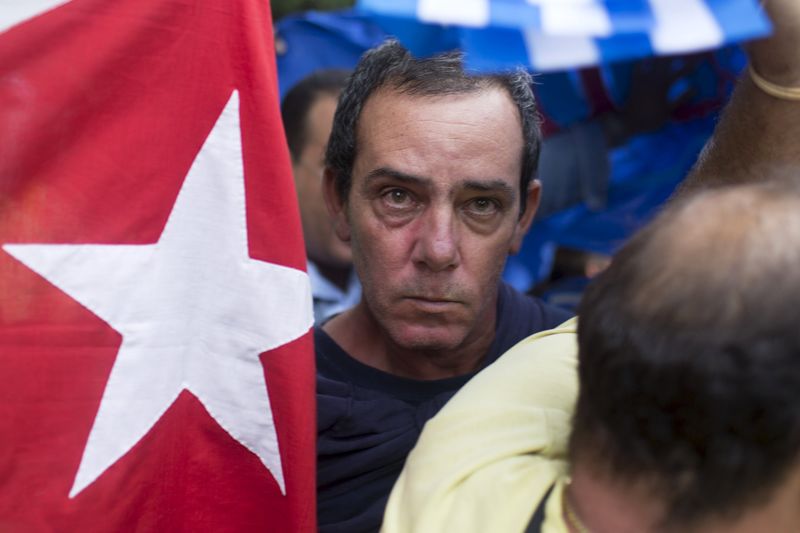By Rebekah Kebede
KINGSTON, Jamaica (Thomson Reuters Foundation) - Three years ago, gay rights activist Maurice Tomlinson fled his native Jamaica for Canada, fearing for his safety after news of his marriage to a man instigated death threats.
But he arrived back in Jamaica this week to challenge the constitutionality of the country's Sodomy Law, that dates back more than 150 years, on the grounds that the law infringes on his human rights by making it illegal to be gay.
According to the law from the British colonial era, consensual sex between two men is illegal, carrying a jail term of up to 10 years with hard labor. Jamaica is one of about 75 countries globally where homosexuality is illegal.
Gay rights activists say the law is used as pretext for harassment by police, discrimination, and violence that has sometimes been fatal. The U.S. State Department said in a 2012 report that homophobia in Jamaica was "widespread" and perpetuated by the country's popular culture.
"It is clear from many persons in Jamaica, we are un-apprehended criminals," Tomlinson, 44, an attorney and law lecturer, said in a telephone interview with the Thomson Reuters Foundation. "(This) is about protecting my own life."
Tomlinson is filing a claim in the Supreme Court of Judicature challenging the constitutionality of the Sodomy Law.
Violence against gay men is commonplace with the Jamaica Forum for Lesbians, All Sexuals, and Gays in 2012 receiving 68 reports of sexually motivated harassment or abuse, including 53 cases of attempted or actual assault and two killings.
The founder of J-FLAG, Brian Williamson, was stabbed to death in his home in 2004.
But in addition to threats of violence, Jamaican law has contributed to high rates of HIV among men who have sex with men, according to the Canadian HIV/AIDS Legal Network and AIDS-Free World, who are supporting Tomlinson's challenge.
Jamaican men who have sex with men have the highest HIV prevalence rate in the western hemisphere at 33 percent, national figures show.
"A gay man seeking HIV testing or visiting the doctor for a health check-up is likely to be asked if he is sexually active. If he answers truthfully, he has just confessed to a crime," according to a factsheet put out by the two organizations.
LITTLE POLITICAL WILL
Although Jamaican Prime Minister Portia Simpson-Miller had promised to review the law during her 2011 election campaign, she has yet to do so nearly four years into her tenure, with another election looming next year.
"It is clear that this is not high on the political agenda ... we felt that the only way we can strike down this law is using the courts," said Tomlinson.
This is not the first time Tomlinson has challenged the law, He filed a case against Jamaica at the Inter-American Commission on Human Rights in February 2012. No hearing date has been set.
The challenge to the law comes against the backdrop of a culture where hostility to gays is high.
Two years ago, another gay man filed a similar challenge to the constitutionality of Jamaica's anti-gay law but abandoned his efforts after he and his family received death threats.
Anti-gay rhetoric has a stronghold in Jamaican popular culture, perhaps most infamously in dancehall star Buju Banton's "Boom Boom Bye Bye," in which he sings about shooting gay men in the head.
Gay rights activists also face opposition from many churches in Jamaica.
The Jamaica Council of Churches' position paper on homosexuality from 2013 reads: "The practice of homosexuality must never be promoted as a normal and natural way of life and on par with heterosexual lifestyle."
The Council opposes gay marriage, but says that homosexuals should also be protected by Jamaica's Constitution.
Tomlinson himself was part of a church that believed you could "pray the gay away" and married a woman with whom he has a son, but that marriage ended after four years. He's since married a man and is still a church-goer.
He acknowledges that the challenge to the law probably won't change public opinion.
"We're not claiming that getting rid of the law is going to eliminate homophobia. What it will do is give us the space in which we can, through popular culture, start addressing homophobia," Tomlinson said.

"If we are considered a criminal community, then we're never able to do that, so nothing will change. It's a like a catch-22."
